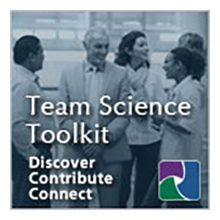- Home
- About
- Membership
- Special Interest Groups
- Conferences
- 2025 SciTS Conference
- 2024 SciTS Conference
- 2023 Scits Conference
- 2022 SciTS Conference
- 2021 SciTS Conference
- 2020 SciTS Conference
- 2019 SciTS Conference
- 2018 SciTS Conference
- 2017 SciTS Conference
- 2016 SciTS Conference
- 2015 SciTS Conference
- 2014 SciTS Conference
- 2013 SciTS Conference
- 2012 SciTS Conference
- 2011 SciTS Conference
- 2010 SciTS Conference
- Past SciTS Conference Photos
- Contact Us
|
Do your students dread the thought of working in groups or teams? Are you ready to incorporate more active learning methods into your teaching style? Have you ever wondered how to go about “flipping” your classroom? If any of your answers is “Yes”, consider trying Team-Based Learning (TBL). TBL is a structured small group active learning method that motivates students through a readiness assurance process to come to class prepared, teaches team skills via experience, and focuses classroom time on higher order skills such as problem-solving and decision-making. This workshop will be a great introduction to TBL, and will be conducted in the TBL format. Participants will prepare ahead, take a readiness assurance test, and then engage actively with their assigned team members. The structure, process, and essential characteristics of an effective TBL module will be emphasized. The SciTS community focuses on the value of team science in research. Team-Based Learning (TBL) focuses on the value of team science in teaching and learning. SciTS attendees who are in academia may be particularly interested in applying team science to their teaching. TBL is also being used for leadership and management training in the non-profit sector. By the end of this workshop you should be able to:
Parts of this workshop will be conducted in the TBL format. Participants should prepare for the workshop by reading this short pre-reading assignment in advance. In advance Preparation Assignment 30 minutes Introductory mini-lecture and team formation 30 minutes Readiness Assurance Process (individual and team readiness assurance tests) 30 minutes Readiness Assurance process debriefing 30 minutes Application Exercises 30 minutes Application Exercise debriefing 30 minutes Closing mini-lecture Presenter: Wayne T. McCormack earned a BS degree in Biology at Creighton University and MS & PhD degrees in Biological Science at Florida State University. After postdoctoral training in immunogenetics at the University of Michigan, he joined the faculty of the department of Pathology, Immunology & Laboratory Medicine at the University of Florida College of Medicine in 1991. Dr. McCormack has been involved in every facet of graduate program planning, curriculum development, recruiting & admissions, and administration, and served as the Associate Dean for Graduate Education and biomedical sciences PhD program director for ten year. He currently serves as the director of Clinical & Translational Science doctoral programs at the UF Clinical & Translational Science Institute, director of the UF Health Office of Biomedical Research Career Development, and associate director of the MD-PhD program. Dr. McCormack is a past chair of the AAMC Graduate research, Education and Training (GREAT) Group (2011-12), and a past president of the Team-Based Learning Collaborative (2012-15). He is actively involved in the national CTSA Consortium as a member of the Workforce Development Domain Task Force and TL1 Directors Group. Dr. McCormack directs and teaches in the graduate-level courses in immunology and professional development (RCR, teaching skills, team science). He has been using Team-Based Learning in his teaching for over twelve years. Dr. McCormack’s research efforts are focused on education-related projects, including team-based learning, responsible conduct of research, team science, career outcomes, and competency-based assessment of science PhD training. Recent publications have addressed measures of career outcomes and the status of current training for team science at CTSA institutions, use of TBL in interprofessional health science education, and competency-based assessment for science PhD training. |

